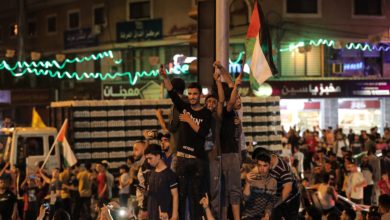On April 12, amidst a tense climate of resistance to rising food prices and the repressive U.S.-supported Hosni Mubarak government, local elections were held throughout Egypt.
|
Industrial workers had called for coordinated protests on April 6 against rising prices and low wages. The protests received only lukewarm support from the Muslim Brotherhood, a major parliamentary opposition group, but the full support of Kefaya, an important left political force. The Mubarak government preemptively arrested activists and threatened factory workers to undermine the protests.
The repression did hurt efforts to organize. However, Egypt still saw major protests throughout the week following April 6. Corporate-hired thugs and the Egyptian police met protesters with violence, employing tear gas, rubber coated bullets and live rounds against workers, young people and families. The protesters defended themselves with rocks.
The largest protests were in the factory town of Mahalla el-Kubra, a center of workers’ organizing efforts in 2005 and 2006 as well. Over 100 people and police were injured and nearly 500 were arrested. Two protesters were reportedly killed by the police.
The April 12 municipal council elections had been postponed two years as the government tried to undermine popular opposition to its U.S.-supported program of economic reform and political repression. In 2005, the Muslim Brotherhood won a fifth of the parliament’s seats. Both 2005 and 2006 were years of great resistance to the Mubarak government, with more than 200 strikes and sit-ins in 2006 alone.
Prior to the elections, the government had rounded up nearly 1,000 members of the Muslim Brotherhood. The Muslim Brotherhood is banned from elections and has no official recognition as a party, but runs its members as independent candidates.
Following the arrests, the Brotherhood pulled their few remaining candidates and called for a boycott of the elections. The repression left Mubarak’s ruling National Democratic Party running unopposed in 90 percent of races.
Egypt has been hit particularly hard by the rising costs of food worldwide—a driving force behind the recent unrest. According to the Egyptian Central Agency for Public Mobilization and Statistics, the price of both cereals and bread rose by 48.1 percent from January to March. The price of cooking oil rose by 45.2 percent while foodstuffs as a whole rose by an average of 23.5 percent. The rise in food prices sharply exceeded the general inflation rate for the 12-month period, which stood at 15.8 percent.
The rising food costs and the economic reforms have imposed insufferable conditions on the Egyptian people. Since February, at least 11 people have died in bread lines that go on for hours. Egypt subsidizes 85 percent of bread, and more and more people are getting in line as the price of unsubsidized bread climbs.
A strategic asset for imperialist designs
Mubarak became Egypt’s president just days after the 1981 assassination of President Anwar Sadat, and has held power ever since. Mubarak, like Sadat, has been friendly to U.S. imperialism. Washington supplies Egypt with $2 billion a year, making it the third largest recipient of U.S. aid. In return, Cairo promotes Washington’s imperialist agenda in the region and imposes neoliberal economic policies on the Egyptian people.
Egypt is a strategic ally for U.S. imperialism in the region, though Israel maintains top status as the colonial outpost for imperialism in the Middle East. By its very nature as a colonial settler state, Israel has been always isolated from the Arab world. The U.S. government’s relationship to Egypt is different—Mubarak and Sadat have both striven to protect U.S. imperialism’s interest in the region while still purporting to represent the Arab world.
The Sadat regime signed a peace treaty with Israel in 1979, making Egypt the only Arab state to have done so. In Israel’s most recent siege and attacks on Gaza, the Egyptian government took little action to support the Palestinians suffering from severe depravation.
Egypt’s controls of the Suez Canal make it a strategic asset to imperialism. A central crossing between Europe and Asia, the canal was controlled by the British imperialists until 1956, when Egyptian nationalist leader Gamal Abdel Nasser nationalized it in response to U.S. economic sabotage. An average of 8 percent of the world’s shipping traffic passes through the canal, whose receipts from July 2005 to May 2006 totaled nearly $3.25 billion.
One result of the economic reforms imposed by Sadat and continued under Mubarak is high levels of poverty. Nearly 40 percent of Egypt’s 80 million people live on about $2 a day. The recent unrest demonstrates that the people of Egypt may be at their breaking point.
As government repression sharpens and economic conditions worsen for Egypt’s working-class majority, resistance will likewise intensify. Should Washington lose the subservient Mubarak, the Egyptian people will have dealt a major blow to U.S. imperialism in the Middle East.






